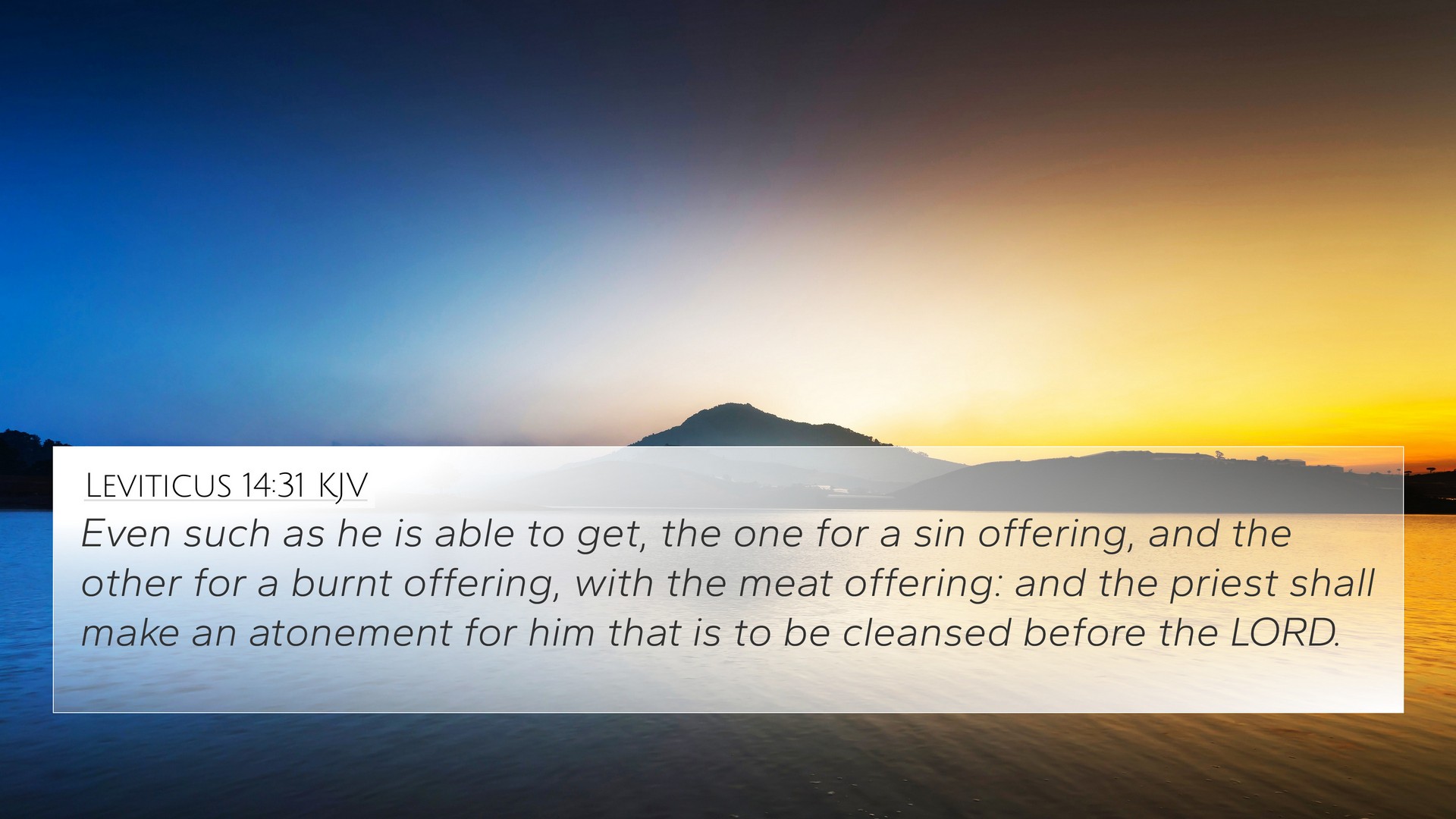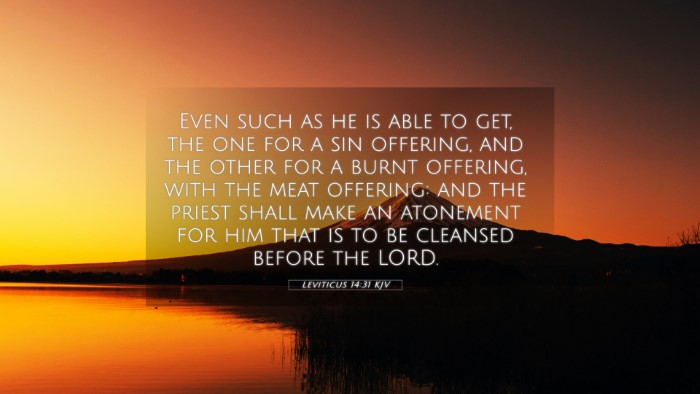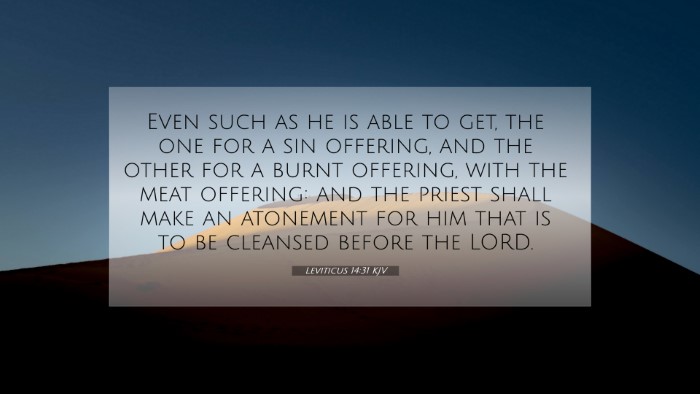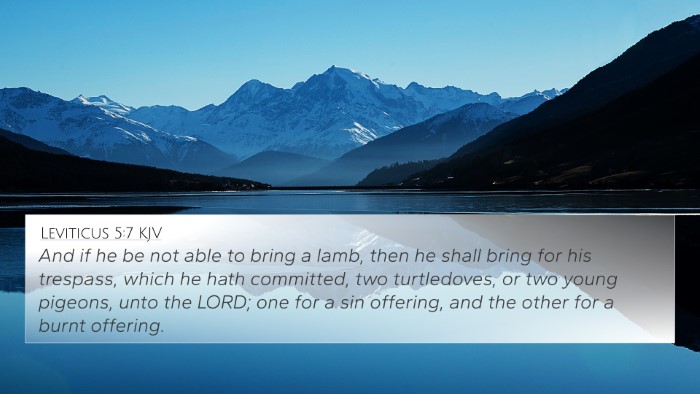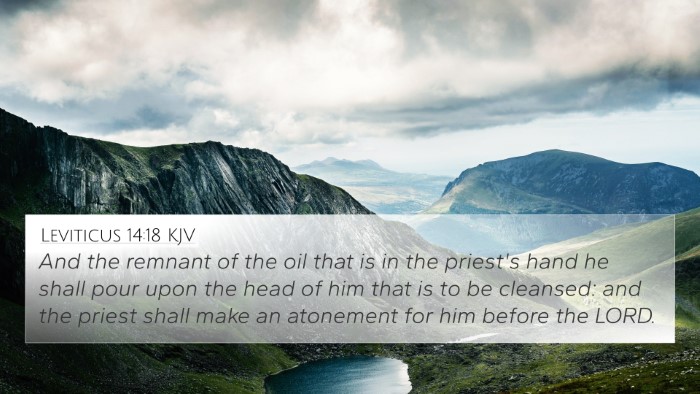Understanding Leviticus 14:31
Verse: Leviticus 14:31 - "And if he be poor, and cannot get so much; then he shall take one lamb for a trespass offering to be waved, to make an atonement for him, and one tenth deal of fine flour mingled with oil for a meat offering, and a log of oil."
Summary of Leviticus 14:31
Leviticus 14:31 addresses the provisions for those who cannot afford the standard offerings outlined for cleansing from leprosy. This verse emphasizes God's consideration for the poor and underscores the principle of mercy in the sacrificial system.
Insights from Public Domain Commentaries
-
Matthew Henry: Henry notes the importance of the sacrificial system and its role in the community's spiritual health. He emphasizes that God’s grace extends even to the poor, showing that the essence of offerings is not merely the material cost but the heart behind the sacrifice.
-
Albert Barnes: Barnes highlights that the specifications in this verse reflect God’s understanding of human circumstances. He explains the symbolic nature of the offerings—each component serving as a means of atonement and healing for the afflicted.
-
Adam Clarke: Clarke elaborates on the significance of the lamb and the flour as central to the offering. He also points out that a "log of oil" represents the richness of God's mercy, indicating that even the simplest offerings were valued by God.
Key Themes in Leviticus 14:31
This verse encapsulates several significant themes:
- Mercy and Compassion: God provides a way for individuals of all economic status to participate in worship and atonement.
- Atonement: The sacrificial system is designed for the cleansing of sin and the restoration of the individual to the community.
- Faith and Obedience: The offerings, regardless of their scale, reflect one's dedication and obedience to God's commands.
Bible Cross-References
This verse connects with various other scripture passages, enhancing our understanding of its themes and implications:
- Exodus 30:15: Discusses monetary offerings for atonement, highlighting God's equity in dealing with the poor and rich alike.
- Leviticus 5:7: Details alternate offerings based on what one can afford, reinforcing the theme of divine flexibility in sacrificial provisions.
- Isaiah 61:1: Proclaims good news to the poor, connecting the spiritual message of liberty and mercy found in the offerings of Leviticus.
- Matthew 11:5: Jesus references the healing of the afflicted, showcasing the fulfillment of the covenant promises and further visualizing the compassion of God.
- Luke 4:18: Jesus’ mission includes healing and proclaiming freedom, illustrating a spiritual fulfillment of Levitical laws.
- Mark 12:42-44: Highlights the story of the widow’s offering, linking to the idea that what matters is the heart's posture, not the size of the gift.
- 1 Peter 2:24: Discusses Christ bearing our sins, which can be seen as the ultimate atonement for humanity, continuing the sacrificial lineage of the Old Testament.
Connections Between Bible Verses
By examining Leviticus 14:31 in conjunction with other scriptures, we can appreciate the rich tapestry of God's message throughout the Bible:
- This verse’s focus on the poor connects to Jesus’ teachings in the Gospels about serving those in need, such as in Matthew 25:40, where the acts of kindness to "the least of these" are directly tied to serving Christ himself.
- Exploring the mechanism of atonement found in this Old Testament verse reveals prophetic links to Christ’s ultimate sacrifice, detailed in Hebrews 10:12-14, fulfilling the need for continual sacrifice.
- The themes of restoration and acceptance present in this verse echo throughout the Psalms, particularly in Psalms 51:17, which highlights a broken spirit as a desirable offering to God.
How to Use Bible Cross-References
In your study of scripture, employing a cross-reference system can illuminate connections and deepen your understanding:
- Use a Bible Concordance: Identify keywords from Leviticus 14:31, such as "offering," "poor," and "atonement," to find verses related to these themes.
- Engage in Comparative Bible Verse Analysis: Highlight similarities and contrasts in themes of sacrifice across different books of the Bible.
- Participate in Cross-Referencing Bible Study Methods: Join a study group focused on linking scriptures to foster a deeper collective understanding.
Conclusion
Leviticus 14:31 serves not only as a guideline for sacrificial offerings but also as a profound reminder of God’s mercy, compassion, and the intrinsic value of sincerity in worship. It challenges believers to reflect on the heart behind their offerings, both materially and spiritually. Through understanding and applying cross-references, one can draw richer insights into the interconnectedness of God’s word.
